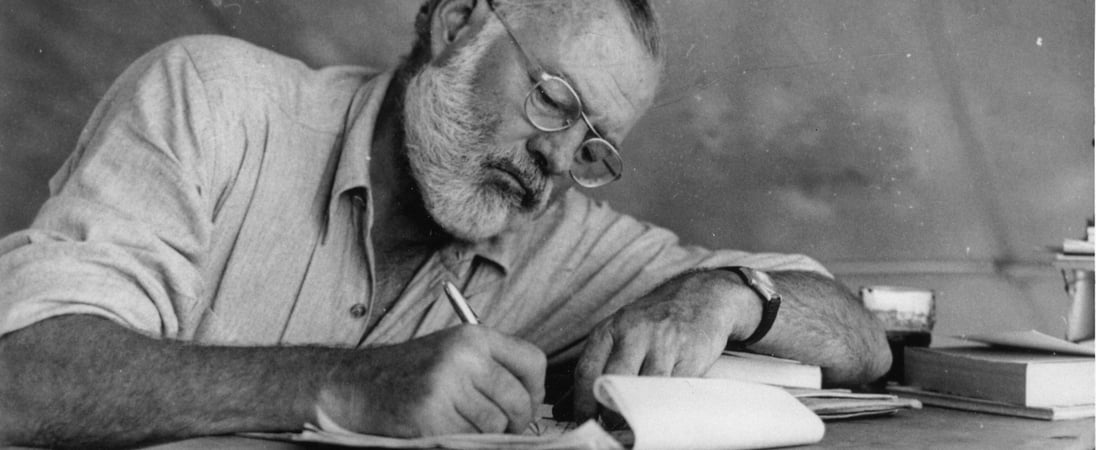
Ernest Hemingway's birthday
Ernest Hemingway, born on July 21, 1899, was a remarkable writer. His stories, filled with adventure and honesty, captured the hearts of many.
Hemingway’s life was as colorful as his novels. He traveled widely, from the battlefields of World War I to the bullfighting rings of Spain.
Throughout his journey, he wrote passionately, earning a Nobel Prize in Literature. His influence on writing remains strong, inspiring generations of readers and writers.
Ernest Hemingway’s Early Years and Learning
Ernest Hemingway grew up in Oak Park, Illinois, a place rich in tradition and values. Born to a doctor father and a musician mother, he experienced a blend of discipline and creativity from a young age.
The young Hemingway loved the outdoors, often exploring the nearby woods and lakes. These adventures sparked his lifelong passion for nature and adventure.
His education began at Oak Park and River Forest High School. There, Hemingway showed an early talent for writing. He wrote for the school newspaper and excelled in English classes.
His teachers recognized his potential, encouraging him to pursue his passion. Despite this, Hemingway did not seek further formal education after high school. He believed in learning from life experiences rather than just from books.
At seventeen, Hemingway took a job as a reporter for the Kansas City Star. The newspaper’s style guide, favoring short, vigorous English, greatly influenced his writing style.
This experience laid the foundation for his later success as a writer. Hemingway’s childhood and education were not just about learning from books but about experiencing life and turning those experiences into stories.
Ernest Hemingway’s Triumphs and Adventures
Ernest Hemingway’s journey to success began with his first novel, “The Sun Also Rises,” in 1926. This book captured the post-war disillusionment of his generation. It quickly made him a respected name in literary circles. His crisp, direct style set him apart from other writers of his time.
Hemingway’s next triumph, “A Farewell to Arms,” came out in 1929. It combined his war experiences with a tragic love story. This novel further cemented his status as a leading writer. Hemingway’s talent for portraying complex emotions in simple language won him a wide audience.
In the 1930s and 1940s, Hemingway continued to explore themes of war, love, and loss. His notable works from this period include “For Whom the Bell Tolls” and “The Old Man and the Sea.” The latter, published in 1952, earned him the Pulitzer Prize. It showcased his ability to weave powerful narratives with deep human themes.
Beyond writing, Hemingway’s life was a series of adventures. He served as an ambulance driver in World War I, a journalist in the Spanish Civil War, and a reporter in World War II. These experiences enriched his writing, giving it authenticity and depth.
Hemingway’s personal life was as eventful as his professional one. He married four times and lived in various countries, including Spain, France, and Cuba. His love for adventure led him to pursuits like bullfighting, deep-sea fishing, and big-game hunting.
In 1954, Hemingway was awarded the Nobel Prize in Literature. This honor recognized his influence on contemporary style and his mastery of storytelling. Hemingway’s works continue to inspire and captivate readers, making him an enduring figure in world literature.
Fascinating Facts About Ernest Hemingway
Early Passion for Music: Hemingway’s mother was a musician who instilled in him a love for music. He played the cello as a young boy, though he never pursued it professionally.
World War I Injury: During World War I, Hemingway was injured by mortar fire. He spent six months recovering in Milan, where he fell in love with a nurse.
Love for Cats: Hemingway adored cats, especially those with extra toes (polydactyl). His home in Key West is famous for these unique cats, descendants of his original pet.
Survived Plane Crashes: In 1954, Hemingway survived two successive plane crashes in Africa. He sustained serious injuries but made a remarkable recovery.
KGB Spy: Surprisingly, Hemingway was briefly a spy for the KGB under the code name “Argo.” However, he wasn’t very active in this role.
Nobel Prize Absence: When Hemingway won the Nobel Prize in Literature, he chose not to attend the ceremony. He cited health reasons for his absence.
Influenced by Art: Hemingway was deeply influenced by the paintings of Cézanne and the writing style of Turgenev, shaping his approach to description and narrative.
Generous Tipper: Known for his generosity, Hemingway once tipped a waiter with a piece of paper that said, “Good luck.” This later sold at an auction for a significant amount.
Also on this date...
National Lamington Day
A tasty tea-time treat that originated as an April Fool’s Day prank in Australia, Lamingtons are just the chocolate-y, coconut-y sponge cake you need in your life.
National Junk Food Day
Sometimes we just crave something deliciously naughty, like that crispy, savory, melt-in-your-mouth goodness that we secretly love to munch on.
Legal Drinking Age Day
Promoting responsible choices, navigating adulthood with a societal threshold for mature decision-making in recreational libation.




